Laura Tedeschi's paintings and photos
Marina, my favourite model.
For me she has the charisma and mystery who had have Fränzi e Marcella Fehrmann for Kirchner.
Tuesday, 29 June 2010
Monday, 28 June 2010
Ennio Morricone - Once upon a time in the West
Do you remember? Good night...
Etichette:
c'era una volta il west,
ennio morricone
Dreaming to get into reality - Sognare per entrare nella realtá
Dipinto di Laura Tedeschi
Dreaming to escape from a stifling reality must be taken in small quantities, even if we all do it.
But the real force of the dreams is to become familiar with thoughts and visions which don't have the right to be into the limited and claustrophobic confines of utilitarian reason.
We not dream to escape from reality, but we dream to get into reality again, better equipped and with more determination.
A volte l'addentrarsi nei sogni ha un carattere quasi di illuminazione: non siamo noi ad aprire la porta, ma è lei che si spalanca improvvisamente per farci entrare in un universo in cui troviamo quello che ci interessa profondamente. Sognare per fuggire da una realtà opprimente va limitato a piccole dosi, anche se tutti lo facciamo. Ma la forza del sogno è quella di impratichirci con pensieri e visioni che non hanno diritto di cittadinanza entro i limitati e claustrofobici confini della ragione utilitaria.
Non si sogna insomma per fuggire dalla realtà, ma per rientrarvi meglio attrezzati e con più determinazione.
Non si sogna insomma per fuggire dalla realtà, ma per rientrarvi meglio attrezzati e con più determinazione.
Etichette:
dipinto,
espressionismo,
sogni,
vita
Friday, 25 June 2010
Slowness and memory - Lentezza e memoria
Is there a secret connection between slowness and memory, between speed and forgetting. Consider a situation of the most banal: a man walking on the street. At one point the man tries to remember something but this is escaping out of his memory. Then, instinctively, slows the pace. Instead anyone who wants to forget a painful event just experienced unconsciously accelerates its pace, as if to get away from something that feels too close to him in time.
In mathematics this existential experience takes the form of two basic equations: the degree of slowness is directly proportional to the intensity of memory; the degree of speed is directly proportional to oblivion.
C'è un legame segreto fra lentezza e memoria, fra velocità e oblio. Prendiamo una situazione delle più banali: un uomo cammina per la strada. A un tratto cerca di ricordare qualcosa, che però gli sfugge. Allora, istintivamente, rallenta il passo. Chi invece vuole dimenticare un evento penoso appena vissuto accelera inconsapevolmente la sua andatura, come per allontanarsi da qualcosa che sente ancora troppo vicino a sé nel tempo.
Nella matematica esistenziale questa esperienza assume la forma di due equazioni elementari: il grado di lentezza è direttamente proporzionale all'intensità della memoria; il grado di velocità è direttamente proporzionale all'intensità dell'oblio.
Thursday, 24 June 2010
European towns - Cittá Europee
Each Twon is associated to a light, a color, a smell ...
Ad ogni cittá é legata una luce, un colore, un odore ...
Etichette:
atmosfera,
cittá,
colore,
dipinto,
espressionismo
Tuesday, 22 June 2010
Francesco Guccini's Lirycs "Van loon" dedicated to his father - Laura Tedeschi's painting " Francesco, one life" dedicated to my grandfather
Paint of laura Tedeschi "Franccesco one life"
I daresay Van Loon was a man whose destiny should have been working hard
Albeit his shoulders and his intelligence could not bear all that;
He seemed to have been kiss’d by his lucky star
When he had to go away;
He’s never gone down into history, we know,
But it’s easy to be wise after the event
But nobody has ever ask’d an eagle
Or a mouse to make a choice;
Then, one certain day marks one’s future
Or a war breaks the glass like a stone...
But I’ve seen mice roaring sometimes
And other times eagles falling down.
How many years we’ve to live together with somebody, day after day,
To understand what he’s got in his mind, what he wants or who he is,
Explorers of void, of anybody
Who’s not I or myself;
Van Loon was alive, yet I believed he was dead
Or worse than ever, useless owing to the distance
Between his many myths and the proudness of my youth days
And my ignorance;
I didn’t know how much he had been sailing
O’er the foamy main like Sebastian Cabot
And that a whalefish had been becoming
Day after day a sweetwater fish...
Van Loon, Van Loon
Tell me what is your burden when your mind
Keeps quiet and finally lets you be,
Do you cherish a shadow, or is peace
Inside you?
I’d like to know
What are you seeing when you look around,
Are they distant sights or are you pleas’d
With this daylight like a new gift
To you?
Van Loon, Van Loon
What are you thinking in the september mist
Sketching here and there the Appennines
Now that you have so much time for thinking,
But of what?
Go, old man, go
Anybody’s his own reasons, don’t be afraid,
And his own rights to do anything
Even tho’ we’ll never know what...
Now Van Loon’s preparing his last journey
He’s already packed like any far-seeing man,
The usual luggage of any simple or wise man
So very little, or nothing
He’ll really go down to his own place or his own history
With all the books that he could not write in his life
And with old friends long lost in his memories,
With infinite
To an everlasting summer, be it even on our mountains,
But, if he wants, even to that untroubled winter
When the frozen snow crunched under his hobnailed
Boots, when he was eighteen...
when he was eighteen...
Francesco Guccini - Van Loon Lyrics dedicated to his father
Translation of Riccardo Venturi
Van Loon, uomo destinato direi da sempre ad un lavoro più forte
che le sue spalle o la sua intelligenza non volevano sopportare
sembrò quasi baciato da una buona sorte
quando dovette andare;
sembra però che non sia mai entrato nella storia,
ma sono cose che si sanno sempre dopo,
d' altra parte nessuno ha mai chiesto di scegliere
neanche all' aquila o al topo;
poi un certo giorno timbra tutto un avvenire
od una guerra spacca come una sassata,
ma ho visto a volte che anche un topo sa ruggire
ed anche un' aquila precipitata...
Quanti anni, giorno per giorno, dobbiamo vivere con uno
per capire cosa gli nasca in testa o cosa voglia o chi è,
turisti del vuoto, esploratori di nessuno
che non sia io o me;
Van Loon viveva e io lo credevo morto
o, peggio, inutile, solo per la distanza
fra i suoi miti diversi e la mia giovinezza e superbia d' allora,
la mia ignoranza:
che ne sapevo quanto avesse navigato
con il coraggio di un Caboto fra le schiume
di ogni suo giorno e che uno squalo è diventato,
giorno per giorno, pesce di fiume...
Vaa Loon, Von Loon,
che cosa porti dentro, quando tace
la mente e la stagione si dà pace?
Insegui un' ombra o quella stessa pace l' hai in te?
Vorrei sapere
che cosa vedi quando guardi attorno,
lontani panorami o questo giorno
è già abbastanza, è come un nuovo dono per te?
Van Loon, Van Loon,
a cosa pensi in questo settembrino
nebbieggiare alto che macchia l' Appennino,
ora che hai tanto tempo per pensare, ma a chi?
Vai, vecchio, vai,
non temere, che avrà una sua ragione
ognuno ed una giustificazione,
anche se quale non sapremo mai, mai!
Ora Van Loon si sta preparando piano al suo ultimo viaggio,
i bagagli già pronti da tempo, come ogni uomo prudente,
o meglio, il bagaglio, quello consueto, di un semplice o un saggio,
cioè poco o niente
e andrà davvero in un suo luogo o una sua storia
con tutti i libri che la vita gli ha proibito,
con vecchi amici di cui ha perso la memoria,
con l'infinito,
dove anche su quei monti nostri è sempre estate,
ma se uno vuole quell' inverno senza affanni
che scricchiolava in gelo sotto le chiodate scarpe di un tempo,
dei suoi diciottanni,
dei suoi diciottanni...
Francesco Guccini - Van Loon, canzone dedicata al padre
I daresay Van Loon was a man whose destiny should have been working hard
Albeit his shoulders and his intelligence could not bear all that;
He seemed to have been kiss’d by his lucky star
When he had to go away;
He’s never gone down into history, we know,
But it’s easy to be wise after the event
But nobody has ever ask’d an eagle
Or a mouse to make a choice;
Then, one certain day marks one’s future
Or a war breaks the glass like a stone...
But I’ve seen mice roaring sometimes
And other times eagles falling down.
How many years we’ve to live together with somebody, day after day,
To understand what he’s got in his mind, what he wants or who he is,
Explorers of void, of anybody
Who’s not I or myself;
Van Loon was alive, yet I believed he was dead
Or worse than ever, useless owing to the distance
Between his many myths and the proudness of my youth days
And my ignorance;
I didn’t know how much he had been sailing
O’er the foamy main like Sebastian Cabot
And that a whalefish had been becoming
Day after day a sweetwater fish...
Van Loon, Van Loon
Tell me what is your burden when your mind
Keeps quiet and finally lets you be,
Do you cherish a shadow, or is peace
Inside you?
I’d like to know
What are you seeing when you look around,
Are they distant sights or are you pleas’d
With this daylight like a new gift
To you?
Van Loon, Van Loon
What are you thinking in the september mist
Sketching here and there the Appennines
Now that you have so much time for thinking,
But of what?
Go, old man, go
Anybody’s his own reasons, don’t be afraid,
And his own rights to do anything
Even tho’ we’ll never know what...
Now Van Loon’s preparing his last journey
He’s already packed like any far-seeing man,
The usual luggage of any simple or wise man
So very little, or nothing
He’ll really go down to his own place or his own history
With all the books that he could not write in his life
And with old friends long lost in his memories,
With infinite
To an everlasting summer, be it even on our mountains,
But, if he wants, even to that untroubled winter
When the frozen snow crunched under his hobnailed
Boots, when he was eighteen...
when he was eighteen...
Francesco Guccini - Van Loon Lyrics dedicated to his father
Translation of Riccardo Venturi
Van Loon, uomo destinato direi da sempre ad un lavoro più forte
che le sue spalle o la sua intelligenza non volevano sopportare
sembrò quasi baciato da una buona sorte
quando dovette andare;
sembra però che non sia mai entrato nella storia,
ma sono cose che si sanno sempre dopo,
d' altra parte nessuno ha mai chiesto di scegliere
neanche all' aquila o al topo;
poi un certo giorno timbra tutto un avvenire
od una guerra spacca come una sassata,
ma ho visto a volte che anche un topo sa ruggire
ed anche un' aquila precipitata...
Quanti anni, giorno per giorno, dobbiamo vivere con uno
per capire cosa gli nasca in testa o cosa voglia o chi è,
turisti del vuoto, esploratori di nessuno
che non sia io o me;
Van Loon viveva e io lo credevo morto
o, peggio, inutile, solo per la distanza
fra i suoi miti diversi e la mia giovinezza e superbia d' allora,
la mia ignoranza:
che ne sapevo quanto avesse navigato
con il coraggio di un Caboto fra le schiume
di ogni suo giorno e che uno squalo è diventato,
giorno per giorno, pesce di fiume...
Vaa Loon, Von Loon,
che cosa porti dentro, quando tace
la mente e la stagione si dà pace?
Insegui un' ombra o quella stessa pace l' hai in te?
Vorrei sapere
che cosa vedi quando guardi attorno,
lontani panorami o questo giorno
è già abbastanza, è come un nuovo dono per te?
Van Loon, Van Loon,
a cosa pensi in questo settembrino
nebbieggiare alto che macchia l' Appennino,
ora che hai tanto tempo per pensare, ma a chi?
Vai, vecchio, vai,
non temere, che avrà una sua ragione
ognuno ed una giustificazione,
anche se quale non sapremo mai, mai!
Ora Van Loon si sta preparando piano al suo ultimo viaggio,
i bagagli già pronti da tempo, come ogni uomo prudente,
o meglio, il bagaglio, quello consueto, di un semplice o un saggio,
cioè poco o niente
e andrà davvero in un suo luogo o una sua storia
con tutti i libri che la vita gli ha proibito,
con vecchi amici di cui ha perso la memoria,
con l'infinito,
dove anche su quei monti nostri è sempre estate,
ma se uno vuole quell' inverno senza affanni
che scricchiolava in gelo sotto le chiodate scarpe di un tempo,
dei suoi diciottanni,
dei suoi diciottanni...
Francesco Guccini - Van Loon, canzone dedicata al padre
Etichette:
dipinto,
espressionismo,
francesco guccini,
vita
Sunday, 20 June 2010
Venezia, lyric by Francesco Guccini
Dipinto di Laura Tedeschi
Venice who dying,
Venice who rests on the sea,
the sweet obsession of his last sad days, Venice sells itself to the tourists,
who are searching, among the people, Europe or Orient
who are watching the smoke or the anger of Porto Marghera rising in the evening.
Stefania was beautiful, Stefania was never hurt,
but she died in childbirth, screaming and sweating in a bed of a large hospital.
She was twenty, she had a husband, and a ring in the finger,
His relatives have told me confused, that his breath almost tripped him between her teeth.
Venice is a hotel, San Marco is certanly also the name of a pizzeria,
the gondola is expensive, the gondola is just a nice round of carousel.
Stefania played with me in the empty and idle summer Sundays,
my mother spoke, his mother sold Venice in a shop.
Venice is a dream... of those who you can buy,
but you can not find yourself with the water in the throat, and a pain at the sea level.
The Doge has changed home and, from a thousand windows, comes only the cry of a newborn baby,
comes only the siren sound of the Mestre's refinery.
Stefania is sinking, Stefania has left something , a gossip newspaper and a rose on her bedside table,
Stefania left a child.
I don't know if her relatives was really hurt to see her die alone, die murdered in a bed of a large hospital.
Venice is a trick that fills the head only with fatality, a scam that does not know about the rest of the world,
Venice is the people who don't care...
Stefania... and a child, to buy or sell Venice will be his fate,
maybe one day we will be happy to be only distant relatives.
Francesco Guccini's lyric: Venezia - traduzione di Laura Tedeschi
Venice who dying,
Venice who rests on the sea,
the sweet obsession of his last sad days, Venice sells itself to the tourists,
who are searching, among the people, Europe or Orient
who are watching the smoke or the anger of Porto Marghera rising in the evening.
Stefania was beautiful, Stefania was never hurt,
but she died in childbirth, screaming and sweating in a bed of a large hospital.
She was twenty, she had a husband, and a ring in the finger,
His relatives have told me confused, that his breath almost tripped him between her teeth.
Venice is a hotel, San Marco is certanly also the name of a pizzeria,
the gondola is expensive, the gondola is just a nice round of carousel.
Stefania played with me in the empty and idle summer Sundays,
my mother spoke, his mother sold Venice in a shop.
Venice is a dream... of those who you can buy,
but you can not find yourself with the water in the throat, and a pain at the sea level.
The Doge has changed home and, from a thousand windows, comes only the cry of a newborn baby,
comes only the siren sound of the Mestre's refinery.
Stefania is sinking, Stefania has left something , a gossip newspaper and a rose on her bedside table,
Stefania left a child.
I don't know if her relatives was really hurt to see her die alone, die murdered in a bed of a large hospital.
Venice is a trick that fills the head only with fatality, a scam that does not know about the rest of the world,
Venice is the people who don't care...
Stefania... and a child, to buy or sell Venice will be his fate,
maybe one day we will be happy to be only distant relatives.
Francesco Guccini's lyric: Venezia - traduzione di Laura Tedeschi
Venezia che muore, Venezia appoggiata sul mare, la dolce ossessione degli ultimi suoi giorni tristi, Venezia, la vende ai turisti, che cercano in mezzo alla gente l' Europa o l' Oriente, che guardano alzarsi alla sera il fumo - o la rabbia - di Porto Marghera... Stefania era bella, Stefania non stava mai male, è morta di parto gridando in un letto sudato d' un grande ospedale; aveva vent' anni, un marito, e l' anello nel dito: mi han detto confusi i parenti che quasi il respiro inciampava nei denti... Venezia è un' albergo, San Marco è senz' altro anche il nome di una pizzeria, la gondola costa, la gondola è solo un bel giro di giostra. Stefania d' estate giocava con me nelle vuote domeniche d' ozio. Mia madre parlava, sua madre vendeva Venezia in negozio. Venezia è anche un sogno, di quelli che puoi comperare, però non ti puoi risvegliare con l' acqua alla gola, e un dolore a livello del mare: il Doge ha cambiato di casa e per mille finestre c'è solo il vagito di un bimbo che è nato, c'è solo la sirena di Mestre... Stefania affondando, Stefania ha lasciato qualcosa: Novella Duemila e una rosa sul suo comodino, Stefania ha lasciato un bambino. Non so se ai parenti gli ha fatto davvero del male vederla morire ammazzata, morire da sola, in un grande ospedale... Venezia è un imbroglio che riempie la testa soltanto di fatalità: del resto del mondo non sai più una sega, Venezia è la gente che se ne frega! Stefania è un bambino, comprare o smerciare Venezia sarà il suo destino: può darsi che un giorno saremo contenti di esserne solo lontani parenti...
Francesco Guccini, Venezia
Etichette:
canzone,
dipinto,
espressionismo,
francesco guccini,
venezia
Thursday, 17 June 2010
Painter and Hats - Pittori e Capplli
Let's dive in the past.
... we are in Barbizon on 1866, near the forest of Fontainebleau, where, following the example of great predecessors like: John Consable, Jean-Baptiste Camille Corot, Théodore Rousseau, Charles-Françoise Daubigny e Jean-Françoise Millet, impressionists came searching inspiration.
The first one was Camille Pissarro, considered the father of the Impressionists. Together with Pissarro we can find, among others, a jung Monet and a jung Cezanne...
Hat, which also sheltered them from the sun, has become part of their figure.
Facciamo un tuffo nel passato.
... siamo nel 1866, a Barbizon, vicino alla foresta di Fontainebleau, dove sull’esempioe orme di a grandi predecessori come: John Constable, Jean-Baptiste Camille Corot, Théodore Rousseau, Charles-Françoise Daubigny e Jean-Françoise Millet, arrivano gli impressionisti in cerca di ispirazione.
Il primo fu Camille Pissarro, definito il padre degli impressionisti.
Assieme a Pissarro troviamo, tra gli altri un giovane Monet e un giovane Cezanne...
Il cappello, che tra l'altro li riparava dal sole, é diventato parte della loro figura.
Pissarro Autoritratto
Pissarro
Pissarro e alcuni giovani impressionisti
Cezanne Autoritratto
Cezanne Autoritratto
Cezanne si reca al lavoro en plein air
Monet
Monet nel giardino di Giverny
Pittore en plain air dipinto da Monet
... we are in Barbizon on 1866, near the forest of Fontainebleau, where, following the example of great predecessors like: John Consable, Jean-Baptiste Camille Corot, Théodore Rousseau, Charles-Françoise Daubigny e Jean-Françoise Millet, impressionists came searching inspiration.
The first one was Camille Pissarro, considered the father of the Impressionists. Together with Pissarro we can find, among others, a jung Monet and a jung Cezanne...
Hat, which also sheltered them from the sun, has become part of their figure.
Facciamo un tuffo nel passato.
... siamo nel 1866, a Barbizon, vicino alla foresta di Fontainebleau, dove sull’esempioe orme di a grandi predecessori come: John Constable, Jean-Baptiste Camille Corot, Théodore Rousseau, Charles-Françoise Daubigny e Jean-Françoise Millet, arrivano gli impressionisti in cerca di ispirazione.
Il primo fu Camille Pissarro, definito il padre degli impressionisti.
Assieme a Pissarro troviamo, tra gli altri un giovane Monet e un giovane Cezanne...
Il cappello, che tra l'altro li riparava dal sole, é diventato parte della loro figura.
Pissarro Autoritratto
Pissarro
Pissarro e alcuni giovani impressionisti
Cezanne Autoritratto
Cezanne Autoritratto
Cezanne si reca al lavoro en plein air
Monet
Monet nel giardino di Giverny
Pittore en plain air dipinto da Monet
Etichette:
impressionismo,
plen air
Wednesday, 16 June 2010
Half shot- Metá scatto
I'm trying to learn photograph ... as always self
sto cercando di imparare a fotografare... come sempre autodidatta
foto di Laura Tedeschi
sto cercando di imparare a fotografare... come sempre autodidatta
foto di Laura Tedeschi
Etichette:
fotografia,
vita
Tuesday, 15 June 2010
Hamlet and the mirror - Amleto e lo specchio
Hamlet is looking in the mirror placed in front of him, move by a sense of corruption that pervades him, asking himself the meaning of his life, but behind that mirror there is the other, that uncle who killed his father, which is the origin of his sense of corruption.
Behind the mirror, the unconscious, there are pictures of that "other" than the ego don't not know, his shadow. Here the mirror is the membrane dividing what is consciousness and what is there instead unconscious. So, as in Alice in Wonderland or Alice behind the mirror, things in the other part, are different, transformed, opposed to those who we recognize in consciousness.
It's with this opposite that Hamlet must draw conclusions, unmask the sense of the arcane made of passion, love, revenge, justice, disappointment, sense of corruption, loss of innocence. But he can't get out of the maze made up of diverse and conflicting feelings. At some point in the scene, we see expressed succinctly, the nature of the paradox in which Hamlet is immersed. First he says to Ophelia: "... I loved you ..." and then says "... I've never loved ..."
The young Prince feels with himself, that he can not evade the sense of corruption spreading into his soul. This is the tragedy of Hamlet: the loss of innocence under the pressure of a strong and terrible pain experienced as something unfair.
Foto di Laura Tedeschi
Amleto è di fronte allo specchio, vale a dire di fronte a se stesso chiedendosi il senso della sua vita, spinto proprio da quel senso di corruzione da cui si sente pervadere, ma dietro a quello specchio c’è l’altro, quello zio che ne ha ucciso il padre e che rappresenta l’origine di ogni suo senso di corruzione. Dietro allo specchio, nell’inconscio, ci sono le immagini di quel altro rispetto all’Io di cui l’Io non sa, cioè la sua ombra. Qui lo specchio rappresenta la membrana che divede ciò che c’è nella coscienza e ciò che c'éinvece nell’inconscio. Come in Alice nel paese della meraviglie o Alice dietro lo specchio, le cose, in quell’altra parte, sono diverse, trasformate, opposte a quelle che riconosciamo nella coscienza. E’ con quell' opposto che Amleto deva fare i conti, smascherare il senso dell’arcano fatto di passione, amore, vendetta, giustizia, delusione, senso di corruzione, perdita dell’innocenza. Ma egli non riesce ad uscire dal labirinto composto di sentimenti contrapposti e variegati. Ad un certo punto nella scena vediamo espresso sinteticamente la natura del paradosso in cui si trova immerso Amleto, da una parte dice ad Ofelia: “…ti ho amata…” o poi dice “…non ti ho mai amata…” Il giovane Principe sente dentro di sé che non riesce ad affrancarsi da quel senso di corruzione che lo pervade e sta dilagando dentro la sua anima. Questo è il dramma di Amleto: la perdita dell’innocenza sotto la spinta forte e terribile del dolore, quando il dolore è vissuto come qualcosa di ingiusto. Infatti il dramma inizia con questo senso di profonda ingiustizia.
Behind the mirror, the unconscious, there are pictures of that "other" than the ego don't not know, his shadow. Here the mirror is the membrane dividing what is consciousness and what is there instead unconscious. So, as in Alice in Wonderland or Alice behind the mirror, things in the other part, are different, transformed, opposed to those who we recognize in consciousness.
It's with this opposite that Hamlet must draw conclusions, unmask the sense of the arcane made of passion, love, revenge, justice, disappointment, sense of corruption, loss of innocence. But he can't get out of the maze made up of diverse and conflicting feelings. At some point in the scene, we see expressed succinctly, the nature of the paradox in which Hamlet is immersed. First he says to Ophelia: "... I loved you ..." and then says "... I've never loved ..."
The young Prince feels with himself, that he can not evade the sense of corruption spreading into his soul. This is the tragedy of Hamlet: the loss of innocence under the pressure of a strong and terrible pain experienced as something unfair.
Foto di Laura Tedeschi
Amleto è di fronte allo specchio, vale a dire di fronte a se stesso chiedendosi il senso della sua vita, spinto proprio da quel senso di corruzione da cui si sente pervadere, ma dietro a quello specchio c’è l’altro, quello zio che ne ha ucciso il padre e che rappresenta l’origine di ogni suo senso di corruzione. Dietro allo specchio, nell’inconscio, ci sono le immagini di quel altro rispetto all’Io di cui l’Io non sa, cioè la sua ombra. Qui lo specchio rappresenta la membrana che divede ciò che c’è nella coscienza e ciò che c'éinvece nell’inconscio. Come in Alice nel paese della meraviglie o Alice dietro lo specchio, le cose, in quell’altra parte, sono diverse, trasformate, opposte a quelle che riconosciamo nella coscienza. E’ con quell' opposto che Amleto deva fare i conti, smascherare il senso dell’arcano fatto di passione, amore, vendetta, giustizia, delusione, senso di corruzione, perdita dell’innocenza. Ma egli non riesce ad uscire dal labirinto composto di sentimenti contrapposti e variegati. Ad un certo punto nella scena vediamo espresso sinteticamente la natura del paradosso in cui si trova immerso Amleto, da una parte dice ad Ofelia: “…ti ho amata…” o poi dice “…non ti ho mai amata…” Il giovane Principe sente dentro di sé che non riesce ad affrancarsi da quel senso di corruzione che lo pervade e sta dilagando dentro la sua anima. Questo è il dramma di Amleto: la perdita dell’innocenza sotto la spinta forte e terribile del dolore, quando il dolore è vissuto come qualcosa di ingiusto. Infatti il dramma inizia con questo senso di profonda ingiustizia.
Etichette:
conscio,
fotografia,
inconscio,
vita
Friday, 11 June 2010
The real freedom - La vera libertá
Free forms, free color, free expression, and free from constraints.
Therefore, only the free expression makes a man really and totally free.
The largest experience. Nothing more that freedom of expression, out of cliches and academic bias, turns a man into a human.
Once you put the witches at the stake. Later many were considered insane, but many fools were right, as Vincent van Gogh. Today censorship creeps among us in a subtle way by giving us the illusion of a happy life "someone" wants to buy our freedom with these small illusions ... little thing ... This "someone" has a very low opinion of us
Dipinto di Laura Tedeschi
Liberi nelle forme, liberi nei colori, liberi nell'espressione, e liberi dalla costrizione.
Solo la libera espressione dunque rende l'essere veramente tale.
La summa delle esperienze, niente, piú che la libertà di espressione, fuori dai luoghi comuni, dai preconcetti, dall'accademismo, rende l'uomo all'uomo.
Una volta si mettevano le streghe al rogho. In seguito molti venivano considerati pazzi, ma molti pazzi avevano ragione. Oggi la censura si insinua tra noi in un modo subdolo dandoci l'illusione di una vita felice "qualcuno" vuole comprare la nostra libertá con queste piccole illusioni ... poca cosa ... questo qualcuno ha un opinione molto bassa di noi
Therefore, only the free expression makes a man really and totally free.
The largest experience. Nothing more that freedom of expression, out of cliches and academic bias, turns a man into a human.
Once you put the witches at the stake. Later many were considered insane, but many fools were right, as Vincent van Gogh. Today censorship creeps among us in a subtle way by giving us the illusion of a happy life "someone" wants to buy our freedom with these small illusions ... little thing ... This "someone" has a very low opinion of us
Dipinto di Laura Tedeschi
Liberi nelle forme, liberi nei colori, liberi nell'espressione, e liberi dalla costrizione.
Solo la libera espressione dunque rende l'essere veramente tale.
La summa delle esperienze, niente, piú che la libertà di espressione, fuori dai luoghi comuni, dai preconcetti, dall'accademismo, rende l'uomo all'uomo.
Una volta si mettevano le streghe al rogho. In seguito molti venivano considerati pazzi, ma molti pazzi avevano ragione. Oggi la censura si insinua tra noi in un modo subdolo dandoci l'illusione di una vita felice "qualcuno" vuole comprare la nostra libertá con queste piccole illusioni ... poca cosa ... questo qualcuno ha un opinione molto bassa di noi
Wednesday, 9 June 2010
Animo infantile
Dipinti di Laura Tedeschi
"Per quanto lontana mi sembri l'infanzia e, in tutto e per tutto, incomprensibile e favolosa, tuttavia ricordo esattamente come giá allora, nel mezzo di quella felicitá, ci fossero in me sofferenze e dissidi.
Quei sentimenti erano allora, nel mio cuore di bambino, esattamente come rimangono per sempre:
dubbi sul proprio valore, oscillazioni tra autostima e scoraggiamento, tra un idealismo che disprezza il mondo e un ordinario piacere sensuale..."
da: "Animo infantile" Hermann Hesse
"Per quanto lontana mi sembri l'infanzia e, in tutto e per tutto, incomprensibile e favolosa, tuttavia ricordo esattamente come giá allora, nel mezzo di quella felicitá, ci fossero in me sofferenze e dissidi.
Quei sentimenti erano allora, nel mio cuore di bambino, esattamente come rimangono per sempre:
dubbi sul proprio valore, oscillazioni tra autostima e scoraggiamento, tra un idealismo che disprezza il mondo e un ordinario piacere sensuale..."
da: "Animo infantile" Hermann Hesse
Etichette:
dipinto,
espressionismo,
hermann hess,
infanzia
Tuesday, 1 June 2010
One, No one and One Hundred Thousand - Uno nessuno e centomila - Luigi Pirandello
This is one of my favourite book, I read it the first time when I was 14 years old and since then this book, this thought, is part of my life.
What are you doing? My wife asked, seeing me, unusually, linger at the mirror.
Nothing, I answered, I look here, inside my nose, this nostril, by pressing it I feel a little pain.
My wife smiled and said:
I thought you looked which way your nose is hanging
I turned like a dog that someone had stepped on his tail:
My nose?
And my wife quietly:
Yes, my dear. Look good: your nose is hanging to the right side.
I was twenty-eight years old, and since then I have always thought my nose, if is not exactly beautiful, is at least very decent, as with all other parts of my person.
So I had been easy to accept and support, what they usually accept and support all of those, who have not had the misfortune of sorties a deformed body: thatis silly to complain as we did physically .
The sudden and unexpected discovery of this defect so annoyed me as an undeserved
punishment.
Vitangelo Moscarda discovers by way of a completely irrelevant question that his wife poses to him that everyone he knows, everyone he has ever met, has constructed a Vitangelo person in their own imagination and that none of these personas corresponds to the image of Vitangelo that he himself has constructed and believes himself to be. The reader is immediately immersed in a cruel game of falsifiying projections, mirroring the reality of social existence itself, which imperiously dictate their rules. As a result, the first, ironic "awareness" of Vitangelo consists in the knowledge of that which he definitely is not; the preliminary operation must therefore consist in the spiteful destruction of all of these fictitious masks. Only after this radical step toward madness and folly in the eyes of the world can Vitangelo finally begin to follow the path toward his true self. He discovers, though, that if his body can be one, his spirit certainly is not. And this Faustian duplicity gradually develops into a disconcerting and extremely complex multiplicity. How can one come to know the true foundation, the substate of the self? Vitangelo seeks to catch it by surprise as its shows itself in a brief flash on the surface of consciousness. But this attempt at revealing the secret self, chasing after it as if it were an enemy that must be forced to surrender, does not give the desired results. Just as soon as it appears, the unknown self evaporates and recomposes itself into the familiar attitudes of the superficial self. In this extremely modern Secretum where there is no Saint Augustine to indicate, with the profound voice of conscience, the absolute truth to desire, where desperation is entrusted to a bitter humorism, corrosive and salvific at the same time, the unity of the self disintegrates into diverse stratifications. Vitangelo is one of those "...particularly intelligent souls ...who break through the illusion of the unity of the self and feel themselves to be multiform, a league of many Is..."

Painting: Laura Tedeschi "Paura, follia"
"Che fai? mia moglie mi domandò, vedendomi insolitamente indugiare davanti allo specchio.
Niente, le risposi, mi guardo qua, dentro il naso, in questa narice. Premendo, avverto un certo dolorino. Mia moglie sorrise e disse:
Credevo ti guardassi da che parte ti pende.
Mi voltai come un cane a cui qualcuno avesse pestato una coda:
Mi pende? A me? Il naso?
E mia moglie placidamente:
Ma sì, caro. Guardatelo bene: ti pende verso destra.
Avevo ventotto anni e sempre fin allora ritenuto il mio naso, se non proprio bello, almeno molto decente, come insieme tutte le altri parti della mia persona. Per cui m’era stato facile ammettere e sostenere quel che di solito ammettono e sostengono tutti coloro che non hanno avuto la sciagura di sortire un corpo deforme: che cioè sia da sciocchi invanire per le proprie fattezze. La scoperta improvvisa e inattesa di quel difetto perciò mi stizzì come un immeritato castigo".
Vitangelo Moscarda scopre, per mezzo di una questione del tutto irrilevante, il fatto che tutti gli altri hanno costruito nella propria fantasia un immagine di lui che non corrisponde a quella che lui crede sia la sua immagine reale.
Il lettore è subito immerso in un gioco crudele di proiezioni falsate, rispecchiando la realtà della vita sociale stessa, che imperiosamente detta le regole. Vitangelo incomincia la difficile operazione che consiste nella distruzione di tutte le maschere fittizie che gli altri vedono nella sua persona. Solo dopo questo passaggio radicale verso la follia e stoltezza agli occhi del mondo, Vitangelo puó finalmente cominciare a seguire la strada verso il suo vero sé. Scopre però che se il suo corpo può essere uno, il suo spirito di certo non lo puó essere. E questa duplicità faustiana si sviluppa gradualmente in una sconcertante molteplicità estremamente complessa. Come si può arrivare a conoscere il vero essere di sé stesso? Vitangelo cerca di prenderlo di sorpresa, spiandolo attraverso la sua anima. Ma questo tentativo di rivelare il segreto di sé, inseguendo il proprio io come se fosse un nemico da fare arrendere, non dà i risultati sperati.
Non appena il sé profondo appare, evapora nell'ignoto, per riapparire sotto forma del sé superficiale. In questo segreto non c'è Sant'Agostino a indicare, con la voce profonda di coscienza, la verità assoluta, l'unità del sé si disintegra in diverse stratificazioni. Vitangelo è una di quelle particolarmente intelligente anime ... che infrangono l'illusione dell'unità del sé e si sentono di essere multiforme...
What are you doing? My wife asked, seeing me, unusually, linger at the mirror.
Nothing, I answered, I look here, inside my nose, this nostril, by pressing it I feel a little pain.
My wife smiled and said:
I thought you looked which way your nose is hanging
I turned like a dog that someone had stepped on his tail:
My nose?
And my wife quietly:
Yes, my dear. Look good: your nose is hanging to the right side.
I was twenty-eight years old, and since then I have always thought my nose, if is not exactly beautiful, is at least very decent, as with all other parts of my person.
So I had been easy to accept and support, what they usually accept and support all of those, who have not had the misfortune of sorties a deformed body: thatis silly to complain as we did physically .
The sudden and unexpected discovery of this defect so annoyed me as an undeserved
punishment.
Vitangelo Moscarda discovers by way of a completely irrelevant question that his wife poses to him that everyone he knows, everyone he has ever met, has constructed a Vitangelo person in their own imagination and that none of these personas corresponds to the image of Vitangelo that he himself has constructed and believes himself to be. The reader is immediately immersed in a cruel game of falsifiying projections, mirroring the reality of social existence itself, which imperiously dictate their rules. As a result, the first, ironic "awareness" of Vitangelo consists in the knowledge of that which he definitely is not; the preliminary operation must therefore consist in the spiteful destruction of all of these fictitious masks. Only after this radical step toward madness and folly in the eyes of the world can Vitangelo finally begin to follow the path toward his true self. He discovers, though, that if his body can be one, his spirit certainly is not. And this Faustian duplicity gradually develops into a disconcerting and extremely complex multiplicity. How can one come to know the true foundation, the substate of the self? Vitangelo seeks to catch it by surprise as its shows itself in a brief flash on the surface of consciousness. But this attempt at revealing the secret self, chasing after it as if it were an enemy that must be forced to surrender, does not give the desired results. Just as soon as it appears, the unknown self evaporates and recomposes itself into the familiar attitudes of the superficial self. In this extremely modern Secretum where there is no Saint Augustine to indicate, with the profound voice of conscience, the absolute truth to desire, where desperation is entrusted to a bitter humorism, corrosive and salvific at the same time, the unity of the self disintegrates into diverse stratifications. Vitangelo is one of those "...particularly intelligent souls ...who break through the illusion of the unity of the self and feel themselves to be multiform, a league of many Is..."

Painting: Laura Tedeschi "Paura, follia"
"Che fai? mia moglie mi domandò, vedendomi insolitamente indugiare davanti allo specchio.
Niente, le risposi, mi guardo qua, dentro il naso, in questa narice. Premendo, avverto un certo dolorino. Mia moglie sorrise e disse:
Credevo ti guardassi da che parte ti pende.
Mi voltai come un cane a cui qualcuno avesse pestato una coda:
Mi pende? A me? Il naso?
E mia moglie placidamente:
Ma sì, caro. Guardatelo bene: ti pende verso destra.
Avevo ventotto anni e sempre fin allora ritenuto il mio naso, se non proprio bello, almeno molto decente, come insieme tutte le altri parti della mia persona. Per cui m’era stato facile ammettere e sostenere quel che di solito ammettono e sostengono tutti coloro che non hanno avuto la sciagura di sortire un corpo deforme: che cioè sia da sciocchi invanire per le proprie fattezze. La scoperta improvvisa e inattesa di quel difetto perciò mi stizzì come un immeritato castigo".
Vitangelo Moscarda scopre, per mezzo di una questione del tutto irrilevante, il fatto che tutti gli altri hanno costruito nella propria fantasia un immagine di lui che non corrisponde a quella che lui crede sia la sua immagine reale.
Il lettore è subito immerso in un gioco crudele di proiezioni falsate, rispecchiando la realtà della vita sociale stessa, che imperiosamente detta le regole. Vitangelo incomincia la difficile operazione che consiste nella distruzione di tutte le maschere fittizie che gli altri vedono nella sua persona. Solo dopo questo passaggio radicale verso la follia e stoltezza agli occhi del mondo, Vitangelo puó finalmente cominciare a seguire la strada verso il suo vero sé. Scopre però che se il suo corpo può essere uno, il suo spirito di certo non lo puó essere. E questa duplicità faustiana si sviluppa gradualmente in una sconcertante molteplicità estremamente complessa. Come si può arrivare a conoscere il vero essere di sé stesso? Vitangelo cerca di prenderlo di sorpresa, spiandolo attraverso la sua anima. Ma questo tentativo di rivelare il segreto di sé, inseguendo il proprio io come se fosse un nemico da fare arrendere, non dà i risultati sperati.
Non appena il sé profondo appare, evapora nell'ignoto, per riapparire sotto forma del sé superficiale. In questo segreto non c'è Sant'Agostino a indicare, con la voce profonda di coscienza, la verità assoluta, l'unità del sé si disintegra in diverse stratificazioni. Vitangelo è una di quelle particolarmente intelligente anime ... che infrangono l'illusione dell'unità del sé e si sentono di essere multiforme...
Etichette:
dipinto,
espressionismo,
libro,
luigi pirandello,
uno nessuno e centomila,
vita
Subscribe to:
Comments (Atom)
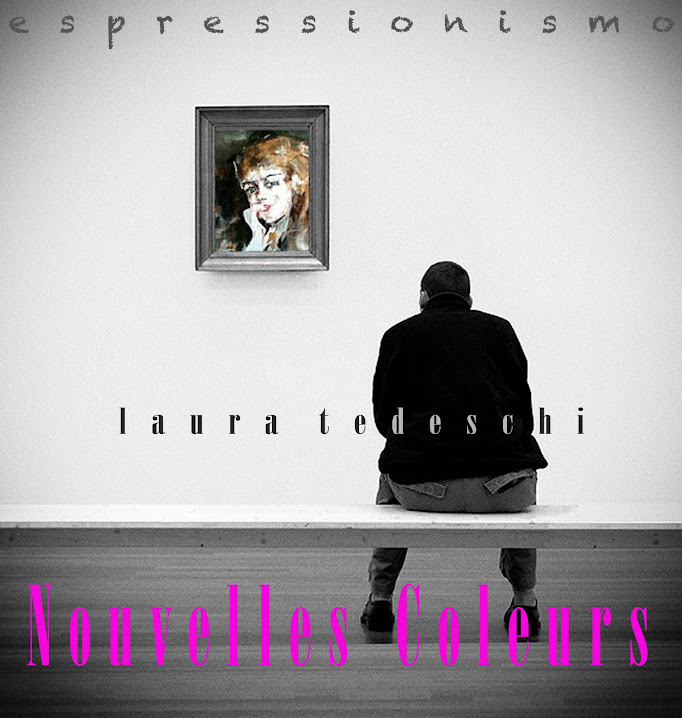






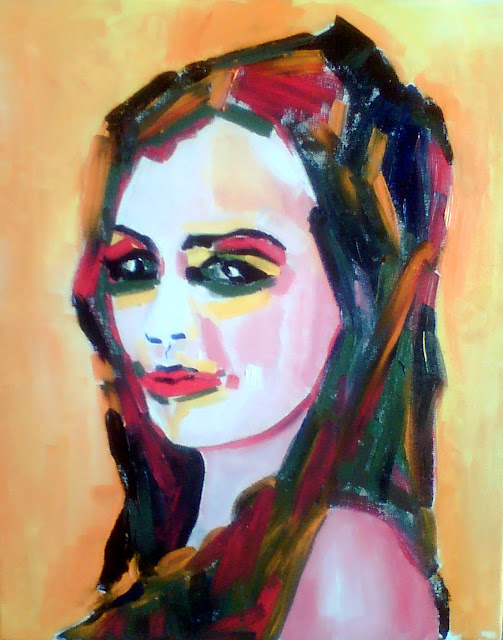
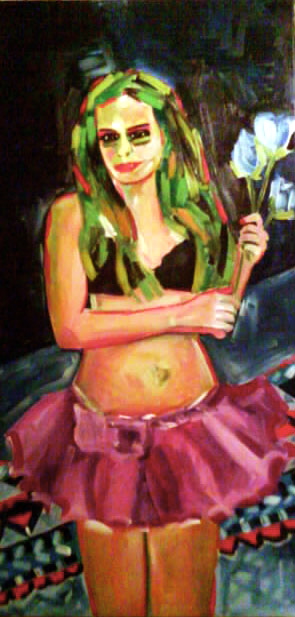

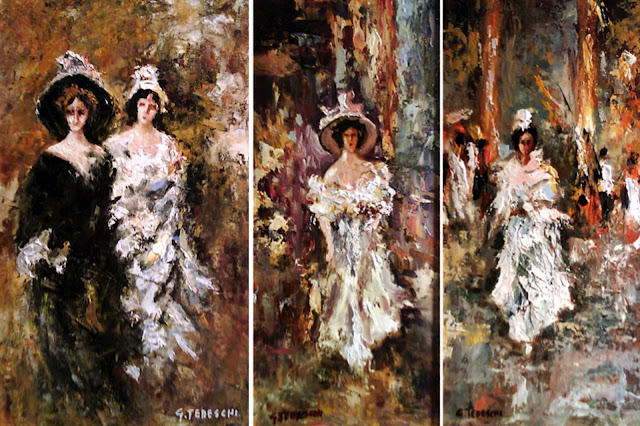






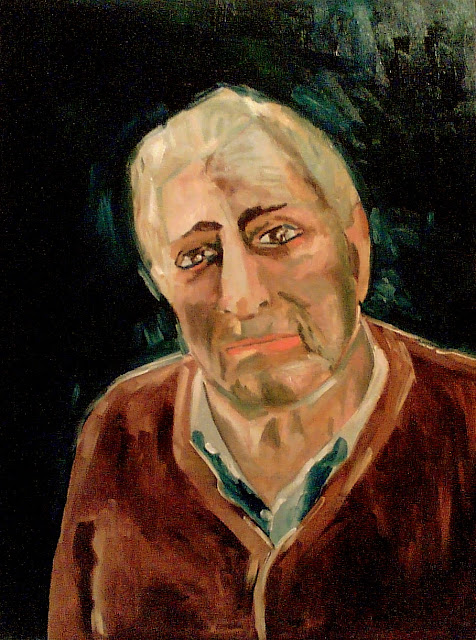









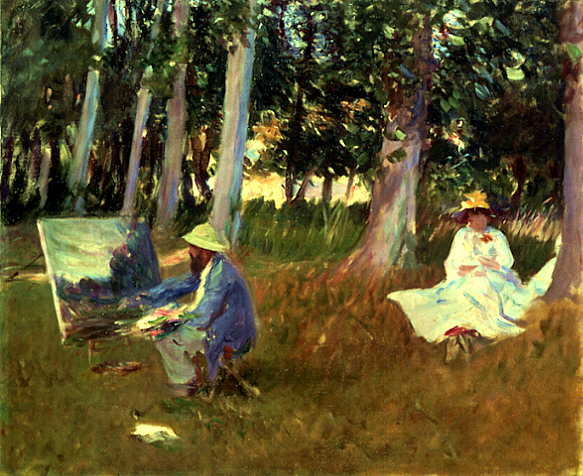
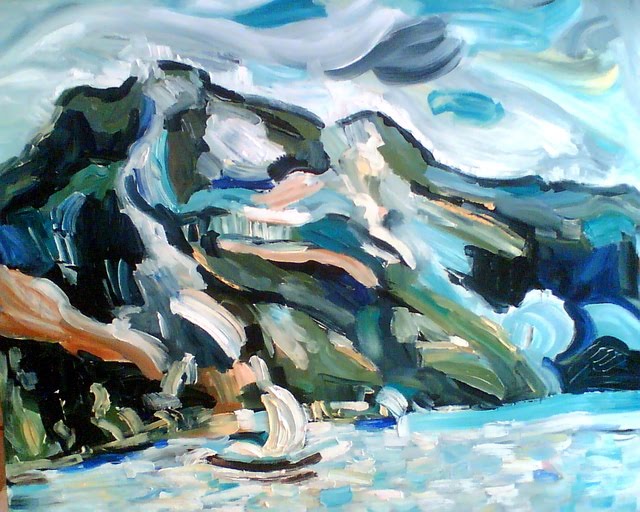






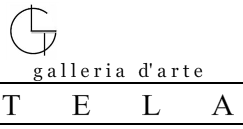
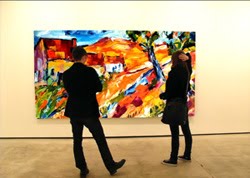
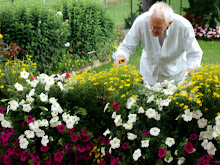













+8.jpg)


